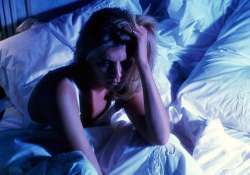Poor sleep? Lice might be the cause
New Delhi: Head lice, parasitic insects that live on the human scalp and survive by drinking human blood, makes the scalp itchy and an expert says that it can be one of the reasons behind

New Delhi: Head lice, parasitic insects that live on the human scalp and survive by drinking human blood, makes the scalp itchy and an expert says that it can be one of the reasons behind sleepless nights.
Anand Philip, general physician, NationWide - The Family Doctors says that lice move by crawling, they cannot fly or jump, so they spread by close head-to-head contact, like when children sit together in a crowded classroom or school bus. Another way of transmitting head lice is by using the comb or hair band or scrunchie of someone who has lice.
“Lice do not cause any disease, but the itching caused by them is very uncomfortable and can cause people, particularly children, to have poor sleep and be distracted throughout the day. The sores caused by scratching can get infected with bacteria, which further complicates the situation,” Philip told IANS.
He says that the itching is usually worse during the evenings and night.
“Some of them might even develop sores on the head, particularly towards the back of the head and behind the ears. Once there are lice in large numbers, they lay eggs called nits which are visible and attach to the hair,” he said.
Philip says that treatment for lice has two components -- killing of the adult and hatched lice.
“It is done through using an anti-louse shampoo which can be bought easily and the removal of the nits, which requires combing with a fine toothed comb. Apply the shampoo as per the instructions on the label and do not use any other shampoo or conditioner for two days.
“After washing hair, keep checking hair for lice and nits every two to three days for three weeks to reduce the chance of getting infected again, or catching any residual lice,” he said.
Anand Philip, general physician, NationWide - The Family Doctors says that lice move by crawling, they cannot fly or jump, so they spread by close head-to-head contact, like when children sit together in a crowded classroom or school bus. Another way of transmitting head lice is by using the comb or hair band or scrunchie of someone who has lice.
“Lice do not cause any disease, but the itching caused by them is very uncomfortable and can cause people, particularly children, to have poor sleep and be distracted throughout the day. The sores caused by scratching can get infected with bacteria, which further complicates the situation,” Philip told IANS.
He says that the itching is usually worse during the evenings and night.
“Some of them might even develop sores on the head, particularly towards the back of the head and behind the ears. Once there are lice in large numbers, they lay eggs called nits which are visible and attach to the hair,” he said.
Philip says that treatment for lice has two components -- killing of the adult and hatched lice.
“It is done through using an anti-louse shampoo which can be bought easily and the removal of the nits, which requires combing with a fine toothed comb. Apply the shampoo as per the instructions on the label and do not use any other shampoo or conditioner for two days.
“After washing hair, keep checking hair for lice and nits every two to three days for three weeks to reduce the chance of getting infected again, or catching any residual lice,” he said.